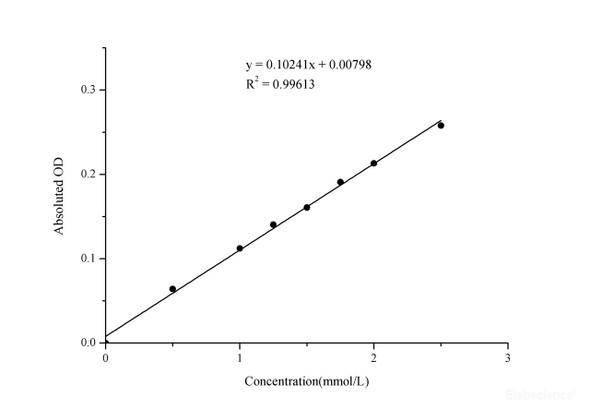

Calcium Assay Kit - Information
Assay Genie's colorimetric calcium assay kit is designed to measure calcium directly in biological samples without any pretreatment. A phenolsulphonephthalein dye in the kit forms a very stable blue colored complex specifically with free calcium. The intensity of the color, measured at 612 nm, is directly proportional to the calcium concentration in the sample. The optimized formulation minimizes any interference by substances such as magnesium, lipid, protein and bilirubin.
Applications
For quantitative determination of calcium ion Ca
2+ and evaluation of drug effects on calcium metabolism.
Calcium Assay Kit - Key Features
- Sensitive and accurate. Use as little as 5 samples. Linear detection range 0.08 mg/dL (20 ) to 20 mg/dL (5 mM) Ca2+ in 96-well plate assay.
- Simple and high-throughput. The procedure involves addition of a single working reagent and incubation for 3 min. Can be readily automated as a high-throughput assay for thousands of samples per day.
- Improved reagent stability and versatility. The optimized formulation has greatly enhanced reagent and signal stability. Cuvet or 96-well plate assay.
- Low interference in biological samples. No pretreatments are needed. Assays can be directly performed on raw biological samples i.e., in the presence of lipid, protein and minerals such as magnesium, iron and zinc.
Calcium Assay Kit - Data Sheet | |
| Kit Includes | Reagent A: 50 mL Reagent B: 50 mL Calcium standard: 1 mL 20 mg/dL Ca2+ |
| Kit Requires | Pipeting devices and accessories |
| Method of Detection | OD612nm |
| Detection Limit | 0.08 mg/dL (20 ) |
| Samples | Biological, food and environment |
| Species | All |
| Protocol Length | 3 min |
| Size | 500 tests |
| Shelf Life | 12 months |
| Storage | Store Reagent and Standard at 4°C |
More Details
CALCIUM is measured to monitor diseases of the bone or calcium regulation disorders. Increased calcium levels in serum are reported in hyperparathyroidism, metastatic bone lesions and hypervitaminosis, while decreased levels are observed in hypoparathyroidism, nephrosis, rickets, steatorrhea, nephritis and calcium-losing syndromes. Urinary calcium levels aid the clinician in understanding how the kidneys handle calcium in certain diseases of the parathyroid gland. Urinary calcium levels are also essential in the medical evaluation of kidney stones. Simple, direct and automation-ready procedures for measuring calcium concentration in biological samples are becoming popular in Research and Drug Discovery.








